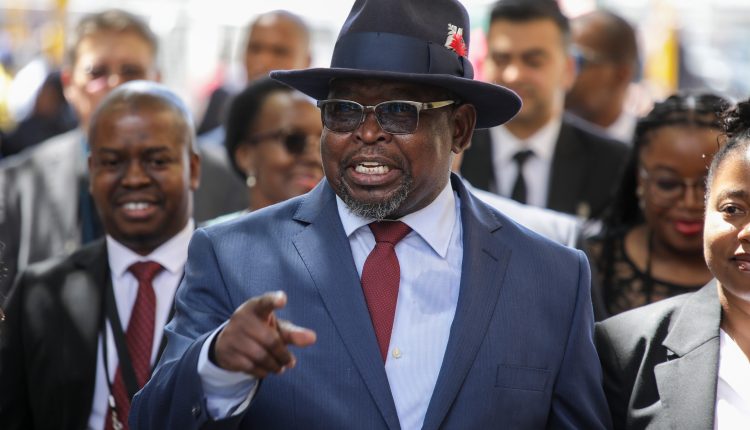South Africa Budget Boosts Welfare Grants Ahead Of Election
South Africa’s finance minister has boosted welfare payments to more than 18 million people in his last budget ahead of May’s general election.
The governing African National Congress (ANC) is facing a tough political challenge as it battles to maintain its outright majority in the 29 May poll.
Left-wing rival the Economic Freedom Fighters (EFF) has already pledged to double payments to the less well off.
But harsh economic conditions leave the government little room for manoeuvre.
Finance Minister Enoch Godongwana was under pressure to curtail the government’s growing budget deficit while also maintaining spending, and keeping taxes low, in order to not put voters off.
The ANC won the 2019 election with 57% of the national vote. Opinion polls suggest that for the first time since it took power at the end of apartheid in 1994, the party’s share of the vote could fall below 50% in the upcoming election.
To cheers from ANC MPs, Mr Godongwana said monthly payments to the elderly, war veterans and those with disabilities, among others, would go up by 100 rand ($5.32; £4.22) a month – an increase in line with inflation of nearly 5%.
The minister also announced a rise in grants to others, including those with children.
There had been speculation, in line with what President Cyril Ramaphosa had said earlier this month, that the government would increase monthly payments to low earners and those most in need.
This Social Relief of Distress Grant (SRD grant) of 350 rand is currently paid to nine million people.
Among the key beneficiaries are those without jobs, in a country where just under a third of the potential workforce is unable to find work and joblessness among the youth stands at 4.7 million.
Mr Godongwana said efforts were under way to “improve” their SRD grant. He failed to disclose by how much, saying more revenue first needed to be found.
The EFF, which is eating into the ANC’s support, has promised in its election manifesto to double all permanent social grants.
It has also promised a brand-new payment to all unemployed high school and university graduates.
One of the EFF’s MPs, popular musician Ringo Madlingozi, suggested that the minister was avoiding responsibility with his speech and urged the party’s supporters to vote the ANC out.
Meanwhile, the main opposition Democratic Alliance (DA) has said it would boost payments, particularly for those with children.
It also wants to convert the SRD grant into a job seekers’ payment. It has criticised the budget for doing nothing for vulnerable South Africans.
While Mr Godongwana is looking to boost government revenue, he did not raise income tax levels, though more people will be paying tax as their wages go up.
Neither did he increase the general fuel levy for car drivers but a rise in the carbon tax will boost petrol prices.
The finance minister also increased taxes on cigarettes, e-cigarettes, cigars and alcohol.
Overall, South Africa is faced with a slow-growing economy. Mr Godongwana admitted that the “size of the pie is not growing fast enough to meet our developmental needs”.
It is not producing enough jobs for the 7.9 million unemployed. People are also faced with an increase in the cost of living and constant power cuts, affecting homes and businesses.
The ANC will now have to convince enough voters that it can still be relied on to manage the economy to the benefit of South Africans.
While opposition parties labelled the budget an election campaign speech for the ANC, Mr Godongwana denied this.
He told local TV station eNCA that his budget was about addressing the country’s balance sheet, and would have no bearing on the elections.
BBC/Jide Johnson.


Comments are closed.